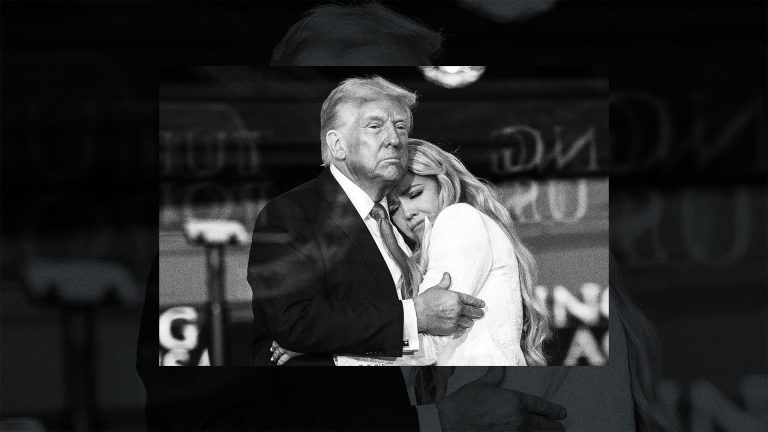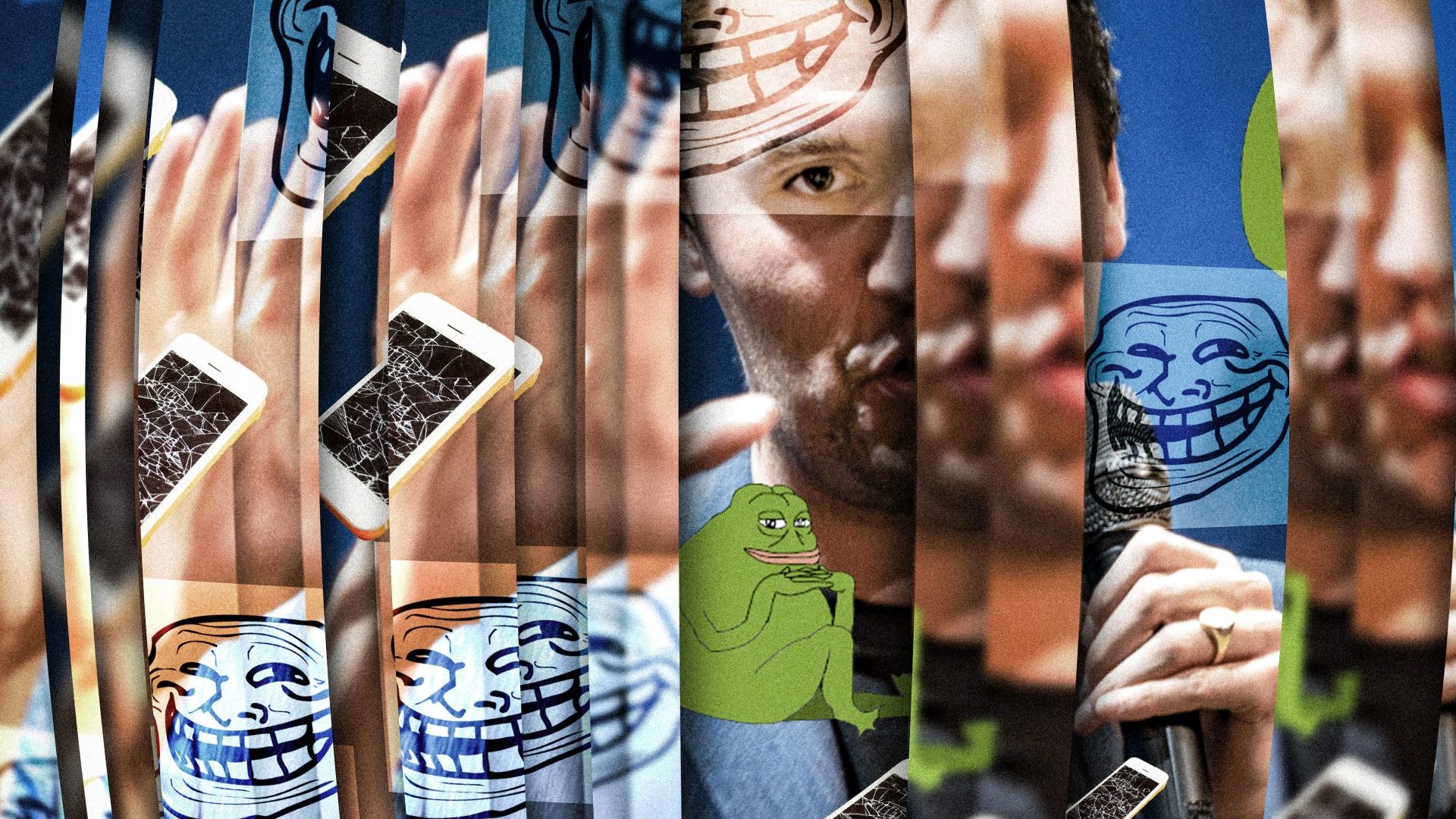If the internet has any rules, then the first one might be this: nothing is serious, anything can be a provocation, and everything is content. That holds for even the most horrifying news. And as the internet becomes our reality, this dark cynicism extends well beyond the online world – a terminal form of irony.
The following has become a grimly familiar pattern: In the immediate aftermath of any act of public violence in the US – be it a mass shooting, an assassination attempt, or some other fresh horror – far right accounts on social media will immediately claim that the shooter is trans. Given that the real identity of a perpetrator usually emerges in days, if not hours, and most are straight white men, it’s not clear what motivates those online to do it.
Perhaps it’s a bid to shape the online narrative. It could be an attempt to fool credulous mainstream outlets, who jump on any source of information during breaking news stories. It could be a bid to target harassment towards supposed trans “suspects”. It’s likely some combination of all of these – a nihilistic response to tragic events that have just become part of everyday life in America. The race to shape the narrative on any particular killing starts before the facts could ever be knowable.
So it was when Charlie Kirk was shot and killed on a campus in Utah on September 10. Right wing social media accounts immediately claimed that the attacker was believed to be trans, just as mainstream accounts said to ignore those early reports. But eventually that changed: if FBI reports and the criminal indictment against Tyler Robinson are to be believed – and that’s no longer as sure a bet as once it was – Robinson does have a trans partner, and early reports suggested the bullets of the rifle used in the attack had “pro-trans” or “antifa” messages engraved into them.
When the actual messages were released, some of them seemed easy enough to decode – to the extent that mainstream outlets were certainly confident enough to explain them to their audience. There were four messages found on the bullets:
*notices, bulge* OwO, what’s this?
Hey, fascist! Catch ↑ → ↓↓↓
Oh bella ciao, bella ciao, bella ciao ciao ciao
If you read this, you are gay lmao
The Guardian published an earnest analysis claiming “bella ciao” had to be a reference to a 19th-century Italian folk song that became an anti-fascist resistance anthem. The BBC explained that “the three down arrows alone could be a common symbol used to represent the anti-fascist movement”. The governor of Utah said that the messages “speak for themselves”. Some other journalists were certain the messages proved the opposite – that Robinson was motivated by far right ideology.
The reality is very different: the messages are steeped in so many levels of meaning, in so many layers of irony, that they also mean absolutely nothing. You have to be “extremely online” – a term for those of us who not just spend inordinate amounts of time on the internet, but also across its subcultures – to understand the references.
I have spent more than 20 years in these cultures, both as a participant and as a journalist covering them. I can tell you from where these memes originated, the subcultures that share them, and translate them. But I can tell you absolutely nothing about what their use together means in the context of Charlie Kirk’s assassination, and neither can anyone else.
The first message looks like it’s a reference to the furry subculture – a very left-leaning, pro-LGBT online community centred around identifying as anthropomorphised animals. The stereotype of the culture is that it’s fixated on sex (especially when in costume), and the message is a flirtatious one. The complicating factor here is that hyper-sexualised yet juvenile messaging style was ripe for pastiche, and would often be used mockingly or ironically by right wing online groups.
The second message – “hey fascist! Catch” – seems clear enough. But the arrow sequence afterwards is a reference to a keypress combination in the video game Helldivers 2, one which when successfully completed drops a huge bomb on your foes. The game’s setting is a fascistic dystopian future in which, yes, the player is fighting fascists, but the player is a fascist too. That situation is very much played for irony.
Similarly, a reference by someone clearly steeped in online gamer culture to “bella ciao” is less likely to be an earnest callback to the history of Italian anti-fascism as a reference to two other games, Far Cry 6 and Hearts of Iron I, which used a remix of the song in their soundtracks. It went ultra-viral, with hundreds of millions of views – most of them from people with neither any clue of or interest in the song’s history.
That final message is a simple troll: LGBT groups don’t typically make “you’re gay” jokes, except ironically. Sometimes, far right boards and communities use this sort of ironic teenage humour, and sometimes it’s just actual teenagers making these kinds of jokes in gamer communities.
Murder is a terrible, serious act, so understandably we want it to have a terrible and serious motive. And yet nothing in these messages suggests that. Instead, they smatter of nothing more than the ultimate in nihilistic irony trolling – an impression that was confirmed in an apparent exchange between Robinson and his partner in the aftermath of the shooting.
“Remember how I was engraving bullets?” Robinson reportedly messaged. “The fuckin messages are mostly a big meme, if I see “notices bulge uwu” on fox new [sic] I might have a stroke”.
There is little wonder the world struggled to find any particular meaning in the messages: Robinson didn’t know what he meant by them himself. The exchange otherwise shows a young man who, like many others who commit atrocities, delusionally thought he could get away with it, but who otherwise showed what looked like deep and sincere concern for what might happen to his partner as the result of his attack.
Suggested Reading


MAGA is now a holy war
The nearest Robinson got to explaining a motive for the attack he’s suspected of undertaking was that “I had enough of his hatred. Some hate can’t be negotiated out”. Tyler Robinson’s life ended almost as surely as Charlie Kirk’s did as a result of this attack: conviction at best means life in maximum-security jail, and more likely the death penalty. The murder appeared to have no real ideology behind it, no long-held conviction, nothing more than despair at hatred, a deeply misplaced idea of how to take it, and a terminal dose of online irony.
And yet Robinson is far from the only person in this whole mess to be poisoned in such a way. Charlie Kirk was at least as poisoned by ironic trolling as the man accused of killing him. Kirk’s entire career in politics and online influencing was based on playing this double game.
In one forum, he would play the role of sincere debater – an earnest champion of free speech and the first amendment, someone who wanted to engage honestly with people with whom he disagreed, someone still trying to do politics right.
But when he was addressing his own fanbase, or battling challenges from the right, Kirk would engage utterly hatefully. He called on gay men to be executed, and said children should be made to watch those public executions. He denounced Martin Luther King Jr, said the civil rights movement was a mistake, and accused Jews of stirring up hatred against whites. Even as he campaigned for free speech, he would lead efforts to get professors he disliked fired – to the extent that his organisation created and maintained a “Professor Watchlist”, which is online to this day.
These sound like two diametrically opposed figures, and yet they were one man. Which of these was the “real” Charlie Kirk? Did one represent the better side of his nature, and the other his base? Was the “open debate” position a ruse to lull centrists and liberals into missing his real politics – or was Kirk riven by contradictions? Maintaining these contradictory positions required just the same ironic detachment, the same cynicism and nihilism that is radicalising young men to violence.
The reaction of Charlie Kirk’s friends and political allies to his death is steeped in irony and nihilism that is just as bitter. Just as the White House and MAGA movement praise Kirk’s commitment to freedom and free speech, they use his killing by a lone suspect with unclear motives to crack down on their political opponents.
Last year, Charlie Kirk wrote that “Hate speech does not exist legally in America… There’s ugly speech. There’s gross speech. There’s evil speech. And ALL of it is protected by the First Amendment”. Just a few months ago at the Oxford Union, he argued that “you should be allowed to say outrageous things”.
Today, the White House is leading a crusade to cancel or fire anyone who made a poorly thought-through joke or comment in the wake of Kirk’s death. ABC has indefinitely suspended the chat show host Jimmy Kimmel over a confected firestorm about his comments. Donald Trump has threatened to revoke the licences of any network that doesn’t follow suit.
One-time provocateur Milo Yiannopoulos is back, leading a crusade to get pilots fired for social media posts. The US right is engaging in a political crackdown on free speech more flagrant and more dangerous than anything they have railed against at the peak of “cancel culture”.
It is certainly cynical, it is certainly nihilistic, and the irony is inescapable. And yet it is impossible to say whether they are defiling the memory of their dead friend, and going against his wishes, or whether they’re doing exactly what he would have wanted. Was he sincere in his proclamations about the first amendment, or in his actions in hunting down professors – or in both, or neither?
We are being poisoned by terminal irony, seeping into our culture, our politics and even our minds. It is driving people to drastic violence, without them ever being sure of why they’re doing it. It is spurring on unconstitutional crackdowns against fundamental freedoms. It is driving us apart in a way that cannot easily be healed.
It is a malaise that is most obvious online, but whose roots run much deeper and wider. And while it might be afflicting America more urgently than the rest of the world, it is seeping in everywhere, with little in the way of opposition. If we don’t rediscover the value of earnestness, and soon, terminal irony will kill us all – and I mean that sincerely.




